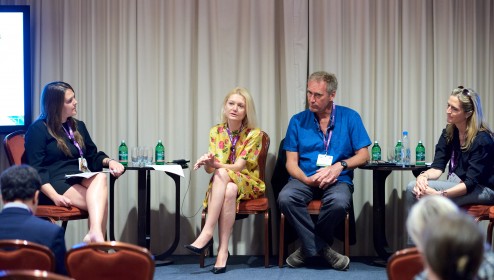
Kateryna Vyshnevska, director for development and co-production, was a panel speaker at “Success in Co-Production: Maximization of Regional and International Business Partnership” on NATPE Global TV Market and Conference.
At the conference, Katerina emphasized that Eastern European media industry has a perennial tradition of high-quality and competitive content production for less money in comparison with the budget the EU is used to. This makes our region an attractive co-production partner for the EU, North America and Asia. An important feature of the region is that local content is more popular there than imported one. Plus the economic capacity of the market is smaller if compared with Western Europe, for instance. Therefore, we cannot afford to buy foreign products for prices Western Europe or North America are used to paying. For maximally productive and efficient cooperation with Eastern Europe, Western counterparts should review their model of working with us and concentrate not on licensing but on co-production as well as on joint projects development.
A session this morning at NATPE Budapest featured executives from HBO Europe, Eccho Rights, Talpa Global and FILM.UA Group discussing the ins and outs of co-producing in Central and Eastern Europe.
Kateryna Vyshnevska said that there is a “mixed bag” of both opportunities and challenges that come with co-producing in the region.
“As a Ukrainian producer, I get this vibe that CEE is still being treated as an emerging market; it is not,” she said. “We’ve been in the business for many years now and have an established tradition. We do know what we’re doing! And we’re doing it really well,” and at a price point that is particularly appealing for partners in the EU or North America.
“The CEE market is not that big,” Vyshnevska added. “We cannot afford to pay the license fees that Western Europe can pay for instance, and local content performs better here anyway. So when you put that all together, it creates a very special ecosystem where it makes sense to shift your licensing into more of a co-development, integrated cooperation model.”
See also a video report

Developed by Argentum IT Lab
